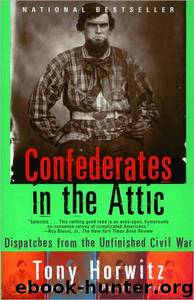Confederates in the Attic by Tony Horwitz

Author:Tony Horwitz
Language: eng
Format: mobi, epub
Tags: Non-Fiction, Travel, War, Humour, History
ISBN: 9780307763013
Publisher: Knopf Doubleday Publishing Group
Published: 1998-01-01T00:00:00+00:00
FROM HIS OLIVE SKIN and unusual surname, I’d guessed that the pharmacist Joe Gerache was of southern European extraction. But when I arrived at his home in suburban Vicksburg, I noticed a Jewish menorah perched on the living room mantel. Then, as we began chatting, he referred to Vicksburg’s schvartze. He caught himself and said, “That’s Yiddish for black people.”
“I know. My grandfather used that word all the time.”
“You’re Jewish?” he asked.
When I nodded, Gerache yelled to his wife in the kitchen. “Ann, you know what? Tony’s an M.O.T.!” Then to me: “That’s ‘member of tribe.’” Before I could say pastrami on rye, I’d been invited—commanded—to attend synagogue the next night and hustled into the living room to watch a documentary Ann had taped about Jewish life in Mississippi. By the time I’d finished, dinner was ready and I found myself at the kitchen table as Joe intoned the Hebrew prayers for food and wine.
“Actually, I’m Catholic,” Joe said, noshing on a dill pickle. “My grandparents came from Italy. But I go to Ann’s services and she comes to mass with me.”
Southern Jewry often made for this sort of colorful intermingling. When I’d lived in Mississippi, a Jewish co-worker and I were frequently asked by a small synagogue in Meridian to help make minyan, the quorum of ten worshipers needed for a Jewish prayer service. The Friday phone calls were always the same: “Y’all gonna come make minyan at church tonight? We’ll be playing poker after the service.” Jewish-Southern culture had also bred the ultimate in fusion food: Gershon Weinberg’s pork and ribs barbecue restaurant in Alabama.
At Vicksburg’s synagogue, the minyan often included three non-Jewish women who sang in the temple’s choir, and several black custodians as well. A visiting rabbi came only on High Holidays, so on other occasions the congregants took turns acting as lay reader. On the Friday night I attended, an insurance salesman in a seersucker suit read the Sabbath service in Southern-accented English. Few among the dozen worshipers appeared to be under sixty. “We haven’t had a bar mitzvah here in ten years,” the insurance salesman said when the short service ended.
As in Meridian, the congregation in Vicksburg kept a curious post-synagogue ritual. Usually, the entire group drove across the bridge to Louisiana to a crawfish joint called Po Boys. On the night I visited, Po Boys was closed, so we went instead to a local restaurant and dined on fried chicken, pork loin and hush puppies. For most of the meal, a woman named Betty Sue held court, quizzing everyone for family gossip, as Southerners were so fond of doing. “What was her maiden name? … Is he Earl’s cousin? … Did he marry that gal from Memphis?”
But there wasn’t much family to talk about, at least not locally. As in many Southern towns, Jews first came to Vicksburg in the nineteenth century as peddlers. Working their way up the Mississippi, they settled down and opened businesses. But in this century, young Jews began leaving for the city.
Download
This site does not store any files on its server. We only index and link to content provided by other sites. Please contact the content providers to delete copyright contents if any and email us, we'll remove relevant links or contents immediately.
| Africa | Americas |
| Arctic & Antarctica | Asia |
| Australia & Oceania | Europe |
| Middle East | Russia |
| United States | World |
| Ancient Civilizations | Military |
| Historical Study & Educational Resources |
In Cold Blood by Truman Capote(3386)
The Innovators: How a Group of Hackers, Geniuses, and Geeks Created the Digital Revolution by Walter Isaacson(3215)
Steve Jobs by Walter Isaacson(2899)
All the President's Men by Carl Bernstein & Bob Woodward(2379)
Lonely Planet New York City by Lonely Planet(2227)
And the Band Played On by Randy Shilts(2210)
The Room Where It Happened by John Bolton;(2161)
The Poisoner's Handbook by Deborah Blum(2141)
The Innovators by Walter Isaacson(2106)
The Murder of Marilyn Monroe by Jay Margolis(2102)
Lincoln by David Herbert Donald(1990)
Being George Washington by Beck Glenn(1980)
A Colony in a Nation by Chris Hayes(1936)
Under the Banner of Heaven: A Story of Violent Faith by Jon Krakauer(1807)
Amelia Earhart by Doris L. Rich(1699)
The Unsettlers by Mark Sundeen(1692)
Dirt by Bill Buford(1682)
Birdmen by Lawrence Goldstone(1670)
Zeitoun by Dave Eggers(1655)
